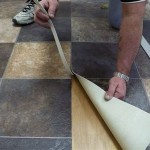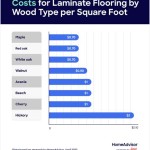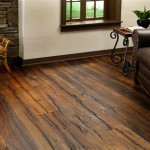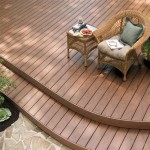How Much Does 1000 Sq Ft Vinyl Flooring Cost Per Square Foot?
Understanding the costs associated with installing vinyl flooring, particularly for a space of 1000 square feet, requires careful consideration of multiple factors. Vinyl flooring has become a popular choice due to its durability, water resistance, ease of maintenance, and relatively lower cost compared to other flooring options like hardwood or tile. However, the final price tag for a 1000 sq ft vinyl flooring project can vary significantly depending on the type of vinyl, installation costs, and any necessary subfloor preparation.
This article will delve into the different types of vinyl flooring, the factors influencing the per-square-foot cost, and provide a comprehensive overview to help you estimate the expenses involved in your flooring project. We will examine the various elements that contribute to the overall cost, enabling a more informed decision-making process when selecting and installing vinyl flooring.
Types of Vinyl Flooring and Their Impact on Cost
The cost of vinyl flooring is heavily influenced by the type of vinyl selected. There are primarily three main types of vinyl flooring available: sheet vinyl, vinyl tile, and luxury vinyl plank (LVP) or luxury vinyl tile (LVT). Each type has its own set of characteristics, advantages, and associated price points.
Sheet Vinyl: Sheet vinyl comes in large rolls and is typically installed in one piece, minimizing seams and creating a water-resistant surface. This makes it a popular choice for bathrooms, kitchens, and laundry rooms. Sheet vinyl is generally the most economical option among the vinyl flooring types, with prices ranging from $1 to $5 per square foot for the material itself. However, the installation of sheet vinyl often requires professional expertise due to the complexity of handling large rolls and ensuring a seamless finish. Installation costs can add another $1 to $3 per square foot, bringing the total per-square-foot cost to between $2 and $8.
Vinyl Tile: Vinyl tile is available in individual squares, offering more design flexibility and easier installation compared to sheet vinyl. It is a good option for DIY projects as individual tiles are easier to manage and install. The cost of vinyl tile ranges from $2 to $7 per square foot for the material. Installation costs can also vary, but if you opt for DIY installation, you can save on labor expenses. Professional installation typically adds $1 to $4 per square foot, resulting in a total cost of $3 to $11 per square foot.
Luxury Vinyl Plank (LVP) and Luxury Vinyl Tile (LVT): LVP and LVT are designed to mimic the look of hardwood or tile, offering a more realistic aesthetic compared to standard vinyl options. These products are thicker and more durable, making them suitable for high-traffic areas and homes with pets or children. LVP and LVT typically cost between $3 and $10 per square foot for the material. Installation costs are generally higher due to the precision required for proper alignment and adherence, ranging from $2 to $5 per square foot. This brings the total per-square-foot cost to between $5 and $15.
The choice between these three types of vinyl flooring will significantly impact the overall cost of covering a 1000 sq ft area. For example, using the lower end of the price ranges, 1000 sq ft of sheet vinyl could cost around $2,000, while LVP could cost around $5,000. Deciding which type best fits your budget and aesthetic preferences is a critical first step.
Factors Affecting the Per-Square-Foot Cost of Vinyl Flooring
Beyond the type of vinyl chosen, several other factors can influence the final per-square-foot cost of installing vinyl flooring. These factors include the quality of the vinyl, the complexity of the installation, and the condition of the subfloor.
Quality of Vinyl: The quality of the vinyl flooring directly correlates with its price. Higher-quality vinyl features thicker wear layers, enhanced durability, and better resistance to scratches, dents, and fading. These premium vinyl options often come with longer warranties, reflecting their superior performance and longevity. Investing in higher-quality vinyl upfront can potentially save money in the long run by reducing the need for frequent repairs or replacements. Lower-quality vinyl, while more affordable initially, may be more susceptible to damage and may require replacement sooner.
Complexity of Installation: The complexity of the installation process can significantly impact labor costs. Simple, rectangular rooms with a smooth, level subfloor will typically require less labor than irregularly shaped rooms with obstacles like stairs, cabinets, or plumbing fixtures. Intricate patterns or designs also add to the installation complexity, increasing the time and skill required to complete the job. If the existing floor needs to be removed, or if the subfloor needs repairs or leveling, this will add to the labor cost.
Subfloor Preparation: The condition of the subfloor is crucial for the successful installation of vinyl flooring. A smooth, level, and dry subfloor is essential to ensure proper adhesion and prevent issues like bubbling, warping, or unevenness. If the subfloor is damaged, uneven, or contaminated with mold or mildew, it must be repaired or replaced before installing the vinyl flooring. Subfloor preparation can include patching holes, leveling uneven surfaces, and applying a moisture barrier. These additional steps can add significantly to the overall project cost. Depending on the extent of the subfloor preparation required, this can add $0.50 to $3 or more per square foot.
Location and Labor Costs: Labor costs for installation vary depending on the geographic location and the experience level of the installer. In areas with a high cost of living, labor rates tend to be higher. Experienced and licensed installers typically charge more than less experienced or unlicensed contractors. However, hiring a professional installer can ensure a high-quality installation that meets industry standards and complies with local building codes. Obtaining multiple quotes from different installers is recommended to compare prices and find the best value for your money.
Additional Materials: Besides the vinyl flooring itself, other materials are required for installation, such as underlayment, adhesives, transition strips, and baseboards. Underlayment provides cushioning, reduces noise, and helps to even out minor imperfections in the subfloor. Adhesives are used to bond the vinyl flooring to the subfloor. Transition strips are used to create smooth transitions between different flooring types or different rooms. Baseboards are used to conceal the edges of the flooring and provide a finished look. The cost of these additional materials can add another $0.50 to $2 per square foot to the overall project cost.
Therefore, when budgeting for a 1000 sq ft vinyl flooring project, it is crucial to consider all these factors to arrive at a realistic estimate.
Estimating the Total Cost for 1000 Sq Ft of Vinyl Flooring
To estimate the total cost of installing 1000 sq ft of vinyl flooring, it is necessary to break down the expenses into material costs, installation costs, and any potential subfloor preparation costs. By considering the different types of vinyl flooring and their associated price ranges, you can develop a more accurate budget for your project.
Scenario 1: Sheet Vinyl Installation Assume a budget of $3 per square foot for sheet vinyl material and $2 per square foot for professional installation. The total cost would be calculated as follows: Material Cost: 1000 sq ft x $3/sq ft = $3,000 Installation Cost: 1000 sq ft x $2/sq ft = $2,000 Total Estimated Cost: $3,000 + $2,000 = $5,000
Scenario 2: Vinyl Tile Installation Assuming a cost of $4 per square foot for vinyl tile and opting for DIY installation to save on labor costs: Material Cost: 1000 sq ft x $4/sq ft = $4,000 Installation Cost: $0 (DIY) Total Estimated Cost: $4,000
Scenario 3: Luxury Vinyl Plank (LVP) Installation Assume a cost of $6 per square foot for LVP material and $3 per square foot for professional installation: Material Cost: 1000 sq ft x $6/sq ft = $6,000 Installation Cost: 1000 sq ft x $3/sq ft = $3,000 Total Estimated Cost: $6,000 + $3,000 = $9,000
Adding Subfloor Preparation: If the subfloor requires significant preparation, such as leveling or moisture remediation, this can add to the overall cost. Suppose the subfloor preparation costs are estimated at $1.50 per square foot for any of the above scenarios: Subfloor Preparation Cost: 1000 sq ft x $1.50/sq ft = $1,500 This amount would then be added to the total estimated cost for each scenario.
These scenarios provide a general idea of the potential costs involved in installing 1000 sq ft of vinyl flooring. However, it is always recommended to obtain detailed quotes from local flooring contractors to get a more accurate estimate based on your specific needs and circumstances. Be sure to ask for a breakdown of the costs, including materials, labor, and any potential additional charges.
In addition to the initial cost, it is important to consider the long-term value of vinyl flooring. Its durability, water resistance, and ease of maintenance make it a practical choice for many homeowners. By carefully selecting the right type of vinyl flooring and ensuring proper installation, you can enjoy a beautiful and functional floor for many years to come.

Cost To Install Vinyl Flooring Fixr

Cost To Install Vinyl Plank Flooring S Fixr

Cost To Install Vinyl Flooring Fixr

Cost To Install Vinyl Flooring Fixr

Cost To Install Vinyl Flooring Fixr

Cost To Install Vinyl Flooring Fixr

Laminate Vs Vinyl Flooring Costs Pros Cons Differences 2025

Flooring Cost Estimator In Fort Myers Estimate Florida Consulting

How Much Does Flooring Installation Cost 2025

How Much Does Vinyl Flooring Installation Cost 2025
Related Posts








